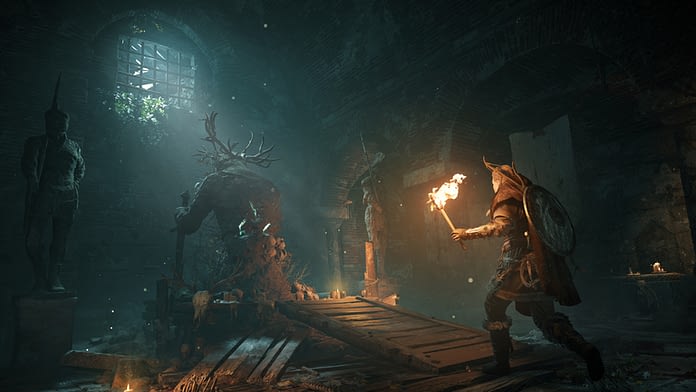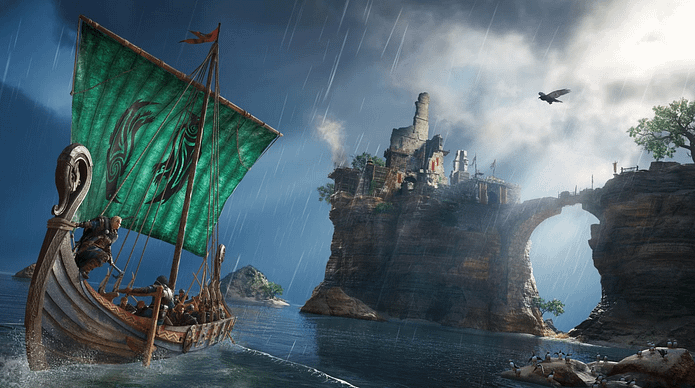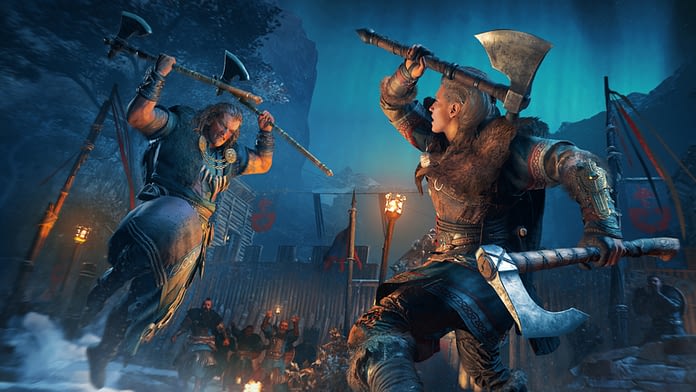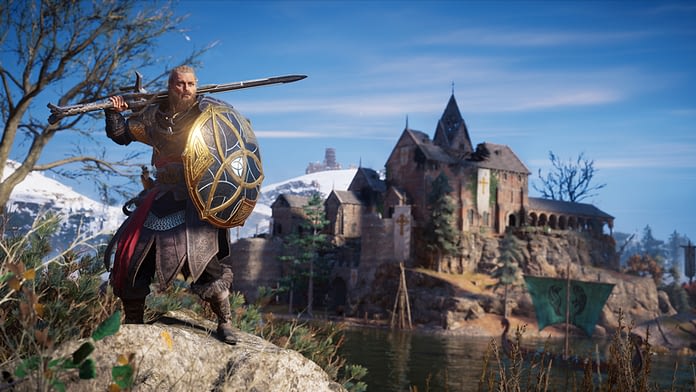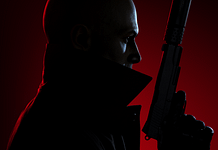The Assassin’s Creed franchise has had somewhat of a rebirth since Origins, ditching some outdated mechanics in favor of offering a more streamlined, almost RPG-like experience. However, it also did away with some fan-favorite mechanics that some would say even defined the franchise to begin with. The latest two games prior to Valhalla also focused on enormous worlds, with almost the entirety of Egypt to explore, and then an almost exhausting sea-faring adventure across ancient Greece. And while I applaud Ubisoft for continually going bigger, which is certainly always breathtaking upon first glance, it can also end up feeling like a chore halfway through the game.
It seems like Ubisoft has kept tabs on the many critiques of both Origins and Odyssey, because Valhalla seems like a direct answer to many of those criticisms, fixing things that needed to be, bringing back systems which were sorely missed, and streamlining mechanics in a way that makes Valhalla easily one of the most enjoyable games in the entire franchise.
Assassin’s Creed Valhalla is a viking-themed adventure which puts players in the shoes of Eivor, a Viking bent on seeking revenge against a clan who wronged theirs, but ultimately finds themselves on a life changing journey to new lands. The Viking stuff is, as expected, amazing, and Ubisoft has gone out of their way to make it seem authentic, at least if History Channel’s Vikings is anything to go by. However, strangely enough, the game’s introduction of the Brotherhood which sees Eivor gaining the hidden blade seems almost shoehorned in. Unlike previous games where the introduction of the Brotherhood and the main character’s initiation felt more organic, it felt almost out of place here. It didn’t detract from my enjoyment, but when it happened, it almost seemed silly.
Minor issue aside, nearly everything else about the game is a downright improvement to not only the two previous games, but to many of the games that came before it as well. But before I get to those, the one thing that’s left unchanged since Origins, which might not please everyone, is the game’s parkour/climbing system. Prior to Origins, there was certainly some player skill and even light puzzle solving required when climbing various structures. However, Valhalla once again employs the “Press X or A to climb literally anything you see” approach. While I certainly didn’t mind it, I do know that this has been a point of contention for some players.
One of the biggest complaints Ubisoft has taken to heart it seems, is the fact that Odyssey might have been too big for its own good, and many players quit purely out of being overwhelmed. Valhalla surely isn’t a small game in comparison, and there still is plenty to do, but Ubisoft has smartly streamlined many instances and mechanics to make it a much more enjoyable experience.
First and foremost is the map size, or I should say, multiple map sizes. Valhalla will see you visiting Norway, England and a few other places that I don’t want to spoil here. However, All those landmasses combined still make up almost 2/3 of what Odyssey’s one giant map was. As someone who often groaned when Odyssey tasked me to sail from one island to the next, which usually took way too long if I didn’t have a fast travel point unlocked, I found this more compact take on the maps a refreshing change.
That’s not to say the world still isn’t dense with things to do, but here Ubisoft has once again made things a bit more palatable. The only quests in your quest log will now be the main quests that are given to you by key characters with a few side quests thrown in for good measure. That means your quest log won’t keep exponentially growing as you’re exploring to the point of being overbearing.
This is solved by World Events, which are quests sprinkled all around each map. None of these will ever grace your quest log, and what’s more, they’re usually super quick to complete. They won’t ever derail you or make you feel like they’re wasting your time, but instead always award you with something meaningful and a great amount of XP, making them always worthwhile to complete whenever you come across one.
If you do decide that you’d rather continue exploring or head toward another Main Quest after starting a World Event, the game will always allow you to come back and do it again.
Since there’s no quest to actually track, the World Event simply restarts from the beginning, so that you’re not left scratching your head when you come back 10 hours after you’ve last attempted it. It’s absolutely brilliant and eliminated all of the fatigue and pressure I felt when I opened my Odyssey quest log.
Collectibles and Wealth items are also dotted around the map, but they, along with World Events, show up as unobtrusive dots and won’t actually clutter your map until you get close enough.
This is an Assassin’s Creed game as well as a Viking game, so let’s dive into both of those sides of the coin and see how this game handles each one. The only kind of first-hand knowledge I can claim I have on Vikings is from the show of the same name on History Channel, and well… Thor, so suffice to say, just a very broad one. With that said, I was buying absolutely everything Ubisoft was selling me in terms of authenticity, which began with the voice acting.
Since you can now switch freely between male and female Eivor (with a third canon option that switches for you), I hopped back and forth between the two. Magnus Bruun voices the male Eivor, while Cecilie Stenspil voiced the female version of the main character. Like in Odyssey, I tip my hat to female Eivor as the (subjectively) superior one. The grit in her voice coupled with her line delivery made everything she said seem so much cooler.
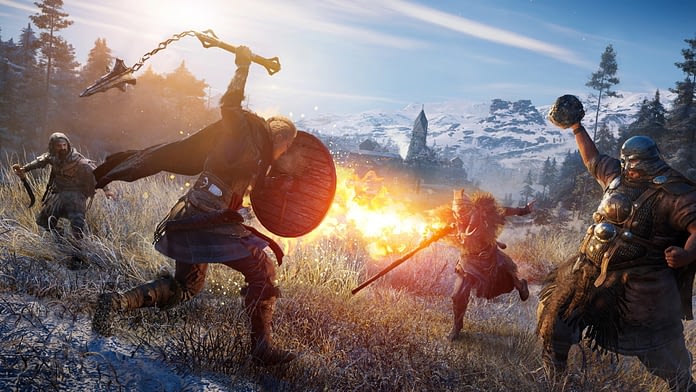
After some early story beats, you find yourself in England starting a settlement of your own which needs to be built and populated as the game goes on. Each building comes with a specific bonus, such as allowing you to fish and then trade in your catches, or letting you buy skills for your mounts that will increase their stamina or even allow them to swim. What’s more, many of these new buildings also come with their own quests, further fleshing out the viking inhabitants that run them, with some truly amazing and even sometimes whacky side-stories.
Of course, in order to build and upgrade your settlement, you’ll need materials, which is where raiding comes in. You and your merry crew of Vikings can hop on a longboat and sail to nearby monasteries or encampments and storm them claiming the material spoils for yourself. While these locations can be tackled solo and in stealth, the building materials are usually locked in buildings that require another Viking to help bust open, not to mention actually opening these crates of wealth being a two-person job as well.
What raiding did was introduce me to the more heads-on approach to combat situations, which seemed appropriate given the Viking setting. While I used to prefer to play mainly in stealth in every game prior to this one, I often found myself just charging into camps with my fellow Vikings, letting our presence be known and taking out anyone who dared to try and take us down.
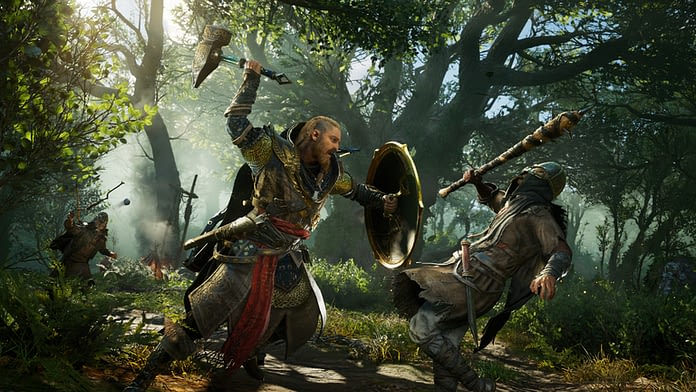
What also helped with this was the ferocity of the combat, highlighted by some truly gruesome executions that always felt satisfying. Combat is still similar to both Origins and Odyssey but this time allows players to equip anything and everything in each hand. That means you can equip a sword and an axe, two axes, a sword and a shield for more defence, or even dual shields if you want. Each of these combinations have a viable combo system with the R1 and R2 (right bumper and right trigger) buttons acting as your light and heavy attack, with L1 (left bumper) acting as both your parry when quick-pressed, and as your weapon specific special when held down. Oh and don’t worry, if dual-wielding two handed swords was something you dreamed your Eivor could do, rest assured, after unlocking a prerequisite skill, you most certainly can.
The Assassin side of the coin is also much improved here, and like I’ve stated before, Ubisoft has really taken to heart the many critiques raised regarding the two prior games. Many, if not all of the grunt enemies can be executed with a single hidden blade stab. However, more elite enemies still won’t die after a single assassination attempt… unless you have the advanced assassination skill unlocked.
The inclusion of this skill was a godsend and made the game feel much closer to the original games where anyone and everyone could be dispatched with a single thrust of your hidden blade. The way it works is simple, upon attempting an assassination, a prompt pops up where you must time your button press again. Assuming you time it right, you’ll get the kill. If you prefered the old way of assassinating enemies, then this is definitely the closest thing to it, and I highly advise investing in the Stealth skill tree (which I’ll get to in a bit) ASAP.
Social stealth also makes a grand return after being left out of both Origins and Odyssey, and feels much more organic than it used to be in games prior. Eivor can now don a hood in Distrust Areas, which allow them to stay out of trouble in various ways. Getting too close to enemies will certainly tip them off, but you can always blend into your surroundings by sitting on a bench, or joining a group of monks as they travel through a town. It’s not super complicated or elaborate, but its inclusion is once again proof that Ubisoft is listening to what fans want, and I applaud them for bringing it back once again.
Odyssey was also heavily criticized for gating the player through various level requirements for main quests, which often meant they’d have to go out of their way to complete a myriad of side quests, many which didn’t offer a good amount of XP to begin with. It was so bad that many believed that Ubisoft’s double XP which could be purchased in the in-game store, was almost mandatory to have a pleasant experience with the game. Valhalla does away with this system entirely, and does so in a few smart ways.
First and foremost, the character’s individual level is gone, now opting for a Power Level instead. While it may sound the same on paper, it is in fact very different, and offers a lot more freedom for players to engage and play how they want. While Eivor does have an XP bar that fills up, each time it does so, you instead gain two Skill Points that can be spent on an ever-expanding constellation screen housing a ton of stat upgrades and some really awesome abilities. Each skill point spent gives Eivor a power level, which means every time you “level up” you essentially gain two power levels.
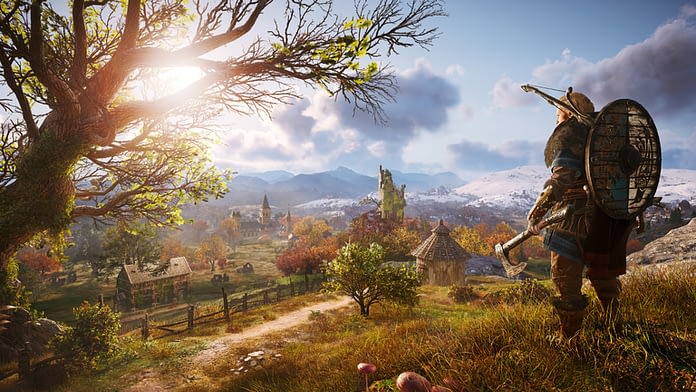
What makes this process even better is the fact that the game absolutely showers you with XP for basically every single activity you participate in, giving you a level, sometimes two per single completed activity. I never found myself stuck because my Power Level was too low, which was an amazing change compared to Odyssey.
The power level also extends to the game’s equipment. Origins and Odyssey had level requirements in order to equip various pieces of armor, and as you leveled, they either needed to be leveled alongside you, which was expensive, or discarded in favor of new armor. Valhalla doesn’t have any requirements for either armor or weapons, meaning players can equip Eivor with whatever armor and weapon combination they like. The bonuses now come from equipping sets or slotting in various runes that can further enhance individual stats.
Armor and weapons can, and should, still be upgraded as you move along the game, but it’s not something you’ll be constantly doing, as the game does a pretty good job at letting you know when an upgrade is available. This can be done by either upgrading the gear’s tier at a blacksmith, which then allows you to further level up the weapon for increased stats. This means that even that plain axe you started the game with, can eventually be upgraded and used until the end of the game, and that is absolutely brilliant.
As we did not have access to next-gen hardware prior to writing this review, I can only speak on the current-gen version of the game. I played on a PS4 Pro, and despite the obvious upgrade in environment, I was surprised at just how consistent the game ran. While we’re no Digital Foundry here, I can say that the game kept a consistent frame rate with no slowdown.
Where it wasn’t all sunshine and roses was in the bug and glitch department. While I never encountered any severe, major game breaking bugs, they were definitely frequent enough to become annoying. During one World Event I had to speak to an NPC after a fist fight who was supposed to be sitting on a chair, but instead he was standing on it, which made it so the speak prompt never popped up. To fix this, I needed to reload an earlier save. There were also plenty of times when I initiated a Raid and none of my fellow Vikings got out of the boat to help me fight. It wasn’t until I prompted the help to bust down a door that one magically appeared next to me.
Another odd issue was when I was trying to get into a locked church with barred doors everywhere and most of the windows too narrow to get in. There were two windows that were clearly big enough and even had breakable windows, but no matter how much I tried getting Eivor to hop in, she just wouldn’t do it. Instead, the game wanted me to climb up a story higher and enter a literally identical window.
While I wouldn’t say these issues caused me to enjoy my time with the game less, as is evident by the score, they were definitely a blemish on what is otherwise a fantastic game.
The Verdict
As an Assassin’s Creed fan who has stuck by the series through its high points, and was certainly disappointed by many of its low points, I can confidently say that what Ubisoft has crafted here was not only crafted with an immense amount of love and respect for the series, but for its fans as well. Assassin’s Creed Valhalla is one Viking adventure you certainly don’t want to miss.

